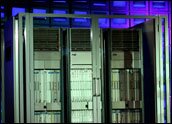Thu 27 May 2004

Cisco CRS-1
Steve Stadland, CIO Today, reports:
Cisco Systems, Inc., today announced the Cisco CRS-1 Carrier Routing System, which is the world’s fastest router. The Cisco CRS-1 router is aimed at telecommunications carriers who route phone calls over IP networks.
It took Cisco four years, half a billion dollars, and 500 engineers to produce the world’s fastest router, known as the CRS-1. According to the Cisco, the new router represents “the future of communications the most ambitious project the company has ever undertaken.”
The CRS-1 Carrier Routing System is designed for telecommunications carriers to transport voice, data, and video services over a converged Internet Protocol (IP) network.
According to the company, the CRS-1 is a new class of routing system designed to deliver continuous system operation, service flexibility and extended system longevity to telecommunications service providers and research organizations.
Answering the Internet Call
As phone calls are being converted more and more into digital data that is transported over the Internet, telecommunications companies are being forced to upgrade their infrastructure equipment. For example,VoIP (Voice over IP) telephony has enabled new communications carriers to provide their customers with phone service at vastly reduced rates when compared against regular phone service. This cost savings has convinced many companies to switch over to VoIP, although other companies and home users are still concerned with the quality of the phone calls, as Internet traffic congestion has been known to make Internet phone calls choppy. Cisco, the manufacturer of telecommunications infrastructure equipment has responded to those concerns with the CRS-1.
Mike Volpi, senior vice president/general manager, Routing Technology Group at Cisco Systems, stated “To be profitable, service providers are focusing on network and service convergence to reduce total cost of ownership, and adding new, revenue-generating services. The Cisco CRS-1 sets new industry standards for reliability, IP service flexibility and scalability, which will enable service providers to become more cost-efficient while delivering a new suite of exciting, multimedia services to business and residential customers.”
All That and Safe, Too
Another key concern of telecommunications carriers is reliability, and now, data and system security. The CRS-1 is built to address those issues.
According to Cisco, the Cisco CRS-1 provides continuous system operation, permitting maintenance and upgrades without any service interruptions. This fault-tolerance capability is achieved through Cisco IOS XR Software, the industry’s only self-healing operating system for multishelf carrier infrastructures scaling up to 92 Tbps.
The memory-protected, microkernel-based operating system enables process-level in-service upgrades, and enables fully distributed processing by separating of the control, data and management planes. This modular design provides fault containment and automatic fault recovery so that processes can be started, stopped and upgraded without human intervention. In addition, the Cisco CRS-1 features self-defending network capabilities to automatically recognize disruptive activities, such as distributed-denial-of-service (DDoS) attacks, with hardware- and software-based infrastructure.
May 26, 2004 6:14PM